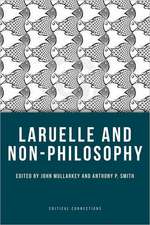Pulling Up the Ladder
Autor Richard D. Brockhausen Limba Engleză Paperback – 31 aug 2003
Preț: 236.65 lei
Nou
Puncte Express: 355
Preț estimativ în valută:
45.29€ • 46.92$ • 37.80£
45.29€ • 46.92$ • 37.80£
Carte tipărită la comandă
Livrare economică 21 martie-04 aprilie
Preluare comenzi: 021 569.72.76
Specificații
ISBN-13: 9780812691269
ISBN-10: 0812691261
Pagini: 356
Dimensiuni: 152 x 228 x 24 mm
Greutate: 0.49 kg
Ediția:New.
Editura: Open Court Publishing Company
ISBN-10: 0812691261
Pagini: 356
Dimensiuni: 152 x 228 x 24 mm
Greutate: 0.49 kg
Ediția:New.
Editura: Open Court Publishing Company
Descriere
"Pulling up the Ladder" discusses how Wittgenstein's early philosophy became widely known largely through the efforts of Russell and other empirically-minded British philosophers, and to a lesser extent, the scientifically-oriented German-speaking philosophers of the Vienna Circle. However, Wittgenstein's primary philosophical concerns arose in a far different context, and failure to grasp this has led to many misunderstandings of the "Tractatus". From Brockhaus' investigation of that context and its problems emerges this new interpretation of Wittgenstein's early thought, which also affords fresh insights into the later Wittgenstein. Wittgenstein's first philosophy was a Schopenhauerian neo-Kantianism, and although he soon rejected much of the substance of Schopenhauer's work, his problems remained closely connected with Schopenhauer's view of the world and man's relation to it. Wittgenstein's early philosophy is a departure from Schopenhauer - a rigorously purified form, so to speak, of Schopenhauer's "World as Will and Representation". In "Pulling up the Ladder", Brockhaus explains Schopenhauer's system of the world as Will and Representation, then proceeds to investigate Frege's realism and Hertz's conventionalistic philosophy of science - two of the elements which fuelled Wittgenstein's purification of Schopenhauer.



















